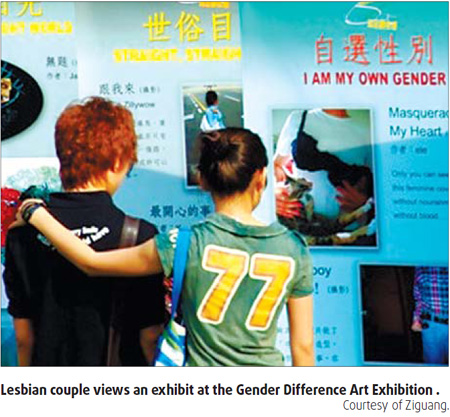Year of Gay China
Feb 14: Qianmen Valentine's Day Photo Shoot, Beijing
Organizers within the LGBT community wanted media attention for their cause, and that is exactly what they got, starting 2009 off with one gay and one lesbian couple dressed in wedding attire posing for photos among the crowd at Qianmen Pedestrian Street, located south of Tian'anmen Square.
Valentine's Day events for LGBT groups have become part of an annual campaign since 2007.
The day is significant for couples as it is closer to March when the annual National People's Congress Standing Committee meeting is held where prominent sexologist and activist Li Yinhe proposed her landmark same-sex marriage bill the year before. (Li has proposed a bill three times: 2003, 2005, and 2006).
"We wanted to spark public debate and awareness," said Jiang Hui of Aibai, who came up with the idea. "It gives people a chance to visualize it. So it's encouragement for LGBT people because they can stand out to express themselves."
The couples who participated were not, in fact, real couples, although they all identify as gay and lesbian.
Xu Bin, who helped organize the first Lala Camp held in Zhuhai in 2007, explained that the volunteers were in relationships with partners that were reluctant to participate, but "were out and willing to promote this cause."
May 17: Rainbow In Motion Bike Ride, Beijing
Cycling through seven colleges in Beijing, students and supporters wore T-shirts and logos with that said "Love Knows No Boundaries." At each campus was an activity to raise awareness either through petitions or the distribution of education materials.
Rainbow in Motion, organized by Aibai and Tongyu, marked the first public campaign in China on the International Day Against Homophobia.
Finding universities to host was not easy, however. "Some [universities] supported it and some didn't give their approval for it to happen, but students did it anyway," Jiang said. "The normal universities are easier, and more willing to allow for events like this on their campuses. I think it is because they are less high-profile," he acknowledged. "Schools like Beida and Tsinghua chose not to participate."
|
|
 0 Comments
0 Comments








Comments